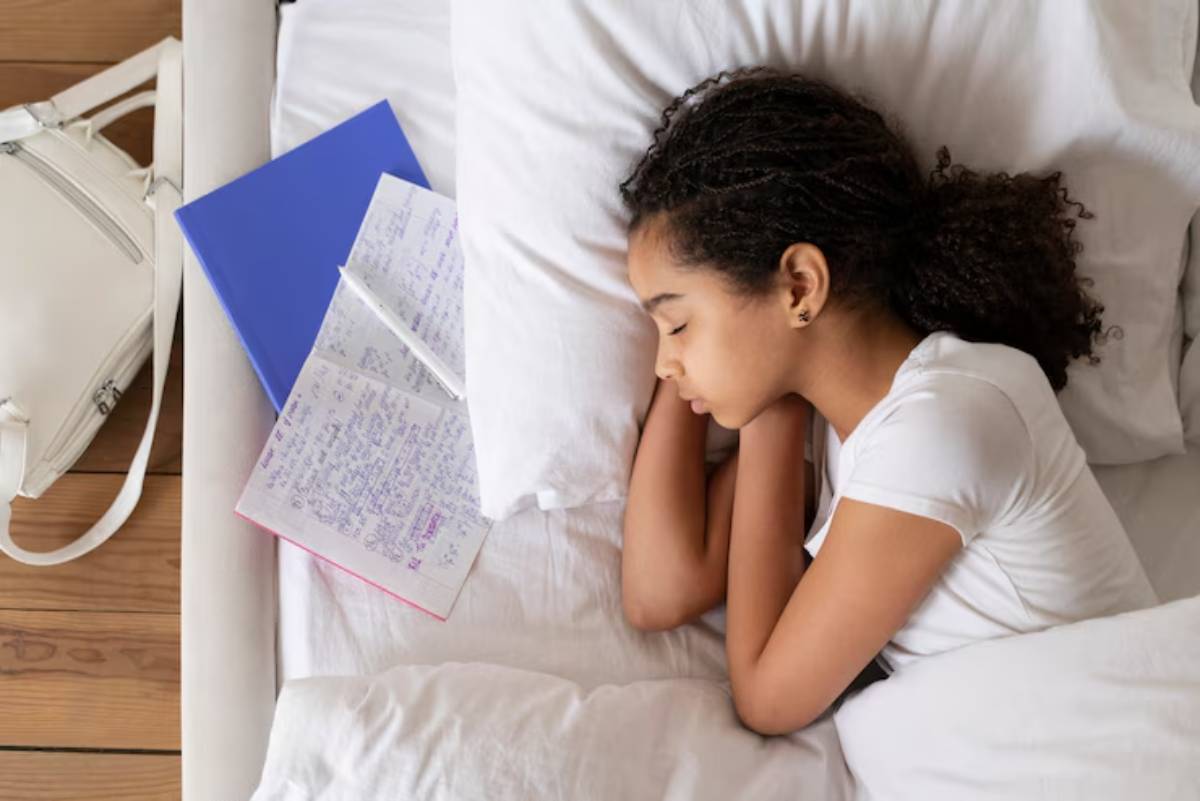The Health Blog

Natural Sleep Tips for Children and Adolescents
If you’ve ever paced outside a bedroom door, listening to a child talk to the ceiling at 11 p.m. — or watched your teen scroll endlessly with bleary eyes — you know that getting kids and teens to sleep well isn’t always easy.
And let’s be honest: modern life doesn’t help. Between screen time, packed schedules, school stress, and the ever-present buzz of overstimulation, sleep can quickly become the last priority for young people. But here’s the thing — it shouldn’t be.
Sleep isn’t just about rest. It’s how the brain grows, how emotions settle, how the body repairs and resets. Especially for kids and teenagers, good sleep supports everything — learning, mood, immune function, even self-esteem.
Understanding the Sleep Needs of Young Minds

Let’s start with the basics. Children and teens aren’t just little adults — their brains and bodies operate on different rhythms.
How much sleep is needed?
- Children (ages 6–12): 9 to 12 hours per night
- Teens (ages 13–18): 8 to 10 hours per night
Now, how much sleep are they actually getting? That’s a different story.
Late homework, social media, after-school activities, and irregular bedtimes can eat into those precious hours — and many kids end up chronically sleep-deprived without even realising it.
Common Sleep Struggles in Kids and Teens
Here’s what tends to show up when sleep is off:
- Trouble falling asleep (especially after screen time)
- Frequent wake-ups or nightmares
- Morning grumpiness or difficulty waking
- Poor focus in school
- Emotional ups and downs
- Immune issues (more colds, slower recovery)
So how do we respond? Not with pressure. Not with punishments. But with a toolbox of supportive, loving, natural sleep tips that meet them where they are.
1. Create a Calming Bedtime Routine — And Stick to It
Yes, the classic advice. But hear it out.
Children, and especially younger teens, thrive on rhythm. When the body gets the same cues each night — bath, book, lights dimmed — it starts to recognise when it’s time to wind down.
Simple steps can include:
- A warm bath or shower
- Brushing teeth and putting on comfy PJs
- A short story, calming music, or quiet time with a parent
- Gentle stretching or breathing exercises
- Lights dimmed gradually as bedtime approaches
This routine doesn’t need to be rigid. But it should feel familiar, safe, and free from last-minute chaos. It’s not just a task list — it’s a transition from stimulation to stillness.
2. Watch the Screens — Especially After Dinner

Here’s the tough one. Tablets, phones, and TVs emit blue light, which tricks the brain into thinking it’s still daytime. That’s bad news for melatonin — the hormone that makes us sleepy.
Tips for screen time management:
- Set a “screens off” rule at least 1 hour before bed
- Keep devices out of bedrooms overnight
- Replace the night-time scroll with a physical book, puzzle, or journaling
- Use night-mode or blue light filters if screens are absolutely necessary
This is one of the hardest habits to shift — especially with teens. But when done consistently, it’s one of the most powerful teen sleep strategies you can implement.
3. Get More Natural Light During the Day
Light doesn’t just affect how we fall asleep — it impacts our entire natural sleep cycle regulation.
Kids and teens often spend most of their day indoors. Artificial lighting just doesn’t send the same signals to the brain that natural sunlight does.
Easy ways to increase light exposure:
- Open blinds first thing in the morning
- Encourage outdoor play after school
- Walk to school when possible
- Sit near a window while doing homework
This morning light exposure helps reset the internal clock, making it easier to feel sleepy at the right time later on.
4. Move the Body — But Not Too Late
Movement isn’t just good for health — it helps burn off stress and restlessness that might otherwise show up at bedtime.
Let’s be clear: this doesn’t mean intense workouts. It can be as simple as a bike ride, jumping on a trampoline, walking the dog, or dancing around the living room.
For teens, sports practice or gym sessions earlier in the day are great — but high-intensity exercise right before bed? Not so much.
5. Keep Bedtime Snacks Light and Balanced

Ever tried sleeping on a full stomach? Not easy. But a growling one? That’s no good either.
A small, calming snack before bed can help regulate blood sugar and prevent overnight wake-ups — especially in younger kids.
Smart choices include:
- A banana with almond butter
- Warm milk or non-dairy milk with honey
- A slice of whole grain toast
- Plain yogurt with a few berries
Avoid sugary treats or caffeine (yes, even chocolate) late in the day.
Food doesn’t just feed the body. It helps signal, “The day is done. Let’s rest.”
6. Create a Bedroom That Says “Sleep”
The bedroom should be a sleep sanctuary — not a battleground, not a second gaming console, and definitely not a snack bar.
Here’s what helps:
- Cool temperature (around 65–70°F or 18–21°C)
- Blackout curtains or a sleep mask
- A small night light if needed — preferably amber-toned
- A white noise machine or fan to block out background sounds
- Soft, breathable bedding and limited clutter
Keep toys, homework, and electronics in other areas whenever possible. The goal is to help the brain associate the space with one thing: winding down.
7. Address Worries — Don’t Just Dismiss Them
Kids and teens often carry more than they show. School stress, friendship drama, body image concerns, family dynamics — all of it can pile up and interfere with sleep.
What’s worse? Telling them to “just relax.”
Instead, try this:
- Offer space to talk before bed
- Use a “worry journal” to write out concerns
- Practise deep breathing or guided visualisation
- Reassure without rescuing — “It’s okay to feel this way. You’re not alone.”
Sometimes, sleep trouble isn’t about bedtime at all. It’s about the weight they’re carrying when they get there.
8. Use Gentle, Natural Aids Only If Needed
Most children and teens don’t need sleep supplements. But when things feel really off — like during travel, schedule changes, or periods of high anxiety — some children’s sleep remedies can help gently reset the rhythm.
Options might include:
- Chamomile or lemon balm tea (mild and calming)
- Magnesium supplements (in child-safe doses)
- Melatonin (only short-term and with professional guidance)
Natural doesn’t mean “casual.” Always consult with a healthcare provider before introducing anything new — especially for younger children.
9. Be Patient — And Focus on Progress, Not Perfection
Changing sleep habits, especially with older kids and teens, doesn’t happen overnight. There will be pushback. There will be late nights. There may even be some eye-rolling.
But consistency is what counts.
Keep showing up with calm routines, clear boundaries, and supportive conversations. Celebrate small wins — “Hey, you got ready for bed on time!” or “You didn’t ask for a second snack tonight — that’s progress.”
Helping Them Grow Into Restful Sleep
Sleep quality isn’t just a health metric. It’s a foundation. For learning, for resilience, for feeling okay in a world that often moves too fast.
Children and teens don’t always know how to ask for what they need — especially when it comes to sleep. So it’s our job to guide them gently, patiently, and with understanding.
Whether it’s dimming the lights a little earlier, creating a wind-down playlist, or simply listening to what’s on their mind, these teen sleep strategies and children’s sleep remedies aren’t just about sleep. They’re about trust, connection, and care.









